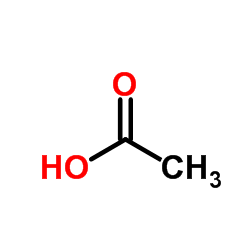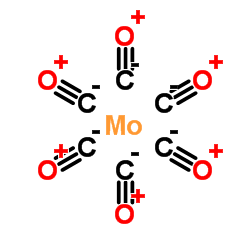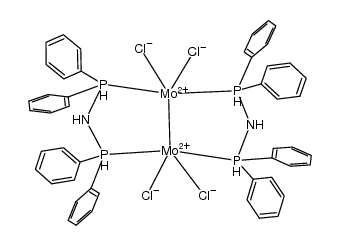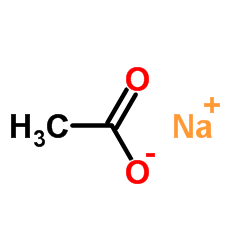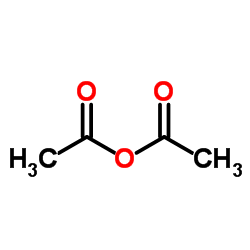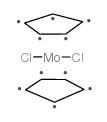14221-06-8
| 中文名 | 乙酸钼(II)二聚体 |
|---|---|
| 英文名 | molybdenum(2+),tetraacetate |
| 中文别名 | 乙酸钼二聚体 |
| 英文别名 |
MFCD00013395
tetra (aceto) dimolybdenum Mo2(CH3COO)4 EINECS 238-089-5 Di-molybdenum tetraacetate Molybdenum(II) acetate Dimolybdenum tetraacetate Molybdenum(II) acetate dimer molybdenum(2+) tetraacetate molybdenum(2+) acetate(1:2) Mo2(acetate)4 |
| 沸点 | 117.1ºC at 760 mmHg |
|---|---|
| 分子式 | C8H12Mo2O8 |
| 分子量 | 428.09600 |
| 精确质量 | 431.86400 |
| PSA | 105.20000 |
| LogP | 0.05520 |
| 外观性状 | 黄色针状 |
| 蒸汽压 | 13.9mmHg at 25°C |
| 储存条件 | 常温密闭避光,通风干燥 |
| 稳定性 | 常温常压下稳定 避免的物料: 氧化物。遇热稳定,但在真空中于300℃可升华。微溶于丙酮和四氢呋喃,但不溶于非极性溶剂。 |
| 水溶解性 | Slightly soluble in organic solvents. Insoluble in water. |
| 分子结构 | 1、摩尔折射率:无可用的 2、摩尔体积(cm3/mol):无可用的 3、等张比容(90.2K):无可用的 4、表面张力(dyne/cm):无可用的 5、介电常数:无可用的 6、极化率(10-24cm3):无可用的 7、单一同位素质量:431.864031 Da 8、标称质量:432 Da 9、平均质量:428.0561 Da |
| 计算化学 | 1.疏水参数计算参考值(XlogP):无 2.氢键供体数量:0 3.氢键受体数量:8 4.可旋转化学键数量:0 5.互变异构体数量:无 6.拓扑分子极性表面积161 7.重原子数量:18 8.表面电荷:0 9.复杂度:25.5 10.同位素原子数量:0 11.确定原子立构中心数量:0 12.不确定原子立构中心数量:0 13.确定化学键立构中心数量:0 14.不确定化学键立构中心数量:0 15.共价键单元数量:6 |
| 更多 | 1. 性状:黄色针状晶体,在空气中或惰性气体中能慢慢分解,由黄色变为绿色,再变为深蓝色。 2. 密度(g/mL,25/4℃):未确定 3. 相对蒸汽密度(g/mL,空气=1):未确定 4. 熔点(ºC):未确定 5. 沸点(ºC,常压):未确定 6. 沸点(ºC,5.2kPa):未确定 7. 折射率:未确定 8. 闪点(ºC):未确定 9. 比旋光度(º):未确定 10. 自燃点或引燃温度(ºC):不适用的 11. 蒸气压(kPa,25ºC):未确定 12. 饱和蒸气压(kPa,60ºC):未确定 13. 燃烧热(KJ/mol):未确定 14. 临界温度(ºC):未确定 15. 临界压力(KPa):未确定 16. 油水(辛醇/水)分配系数的对数值:未确定 17. 爆炸上限(%,V/V):未确定 18. 爆炸下限(%,V/V):未确定 19. 溶解性:不能溶解的 |
|
Section 1: Product Identification Chemical Name:Molybdenum (II) acetate dimer,99% CAS Registry Number:14221-06-8 Formula:Mo2(OOCCH3)4 EINECS Number:238-089-5 Chemical Family:metal acetate salt Synonym:Molybdenum diacetate
Section 2: Composition and Information on Ingredients IngredientCAS NumberPercentACGIH (TWA)OSHA (PEL) Title Compound14221-06-8100%10mg/m3 (as Mo -15mg/m3 Section 3: Hazards Identification Emergency Overview:Irritating to eyes and skin. May be harmful if swallowed or inhaled. Primary Routes of Exposure:Ingestion Eye Contact:Causes mild irritation of the eyes. Skin Contact:Causes slight irritation of the skin. Inhalation:Inhalation of dust may lead to irritation of the respiratory tract. Ingestion:No information is available on the physiological effects of ingestion. May be harmful if swallowed. Acute Health Affects:Irritating to eyes and skin. May be harmful if swallowed or inhaled. Chronic Health Affects:No information available on long-term chronic effects. NTP:No IARC:No OSHA:No SECTION 4: First Aid Measures Immediately flush the eyes with copious amounts of water for at least 10-15 minutes. A victim may need Eye Exposure: assistance in keeping their eye lids open. Get immediate medical attention. Wash the affected area with water. Remove contaminated clothes if necessary. Seek medical assistance if Skin Exposure: irritation persists. Remove the victim to fresh air. Closely monitor the victim for signs of respiratory problems, such as difficulty Inhalation: in breathing, coughing, wheezing, or pain. In such cases seek immediate medical assistance. Seek medical attention immediately. Keep the victim calm. Give the victim water (only if conscious). Induce Ingestion: vomiting only if directed by medical personnel. SECTION 5: Fire Fighting Measures Flash Point:not applicable Autoignition Temperature:none Explosion Limits:none Extinguishing Medium:carbon dioxide, dry powder or foam If involved in a fire, fire fighters should be equipped with a NIOSH approved positive pressure self-contained Special Fire Fighting Procedures: breathing apparatus and full protective clothing. Hazardous Combustion andIf involved in a fire this material may emit toxic organic fumes. Decomposion Products: Unusual Fire or Explosion Hazards: No unusual fire or explosion hazards. SECTION 6: Accidental Release Measures Spill and Leak Procedures:Small spills can be mixed with vermiculite or sodium carbonate and swept up. SECTION 7: Handling and Storage Handling and Storage: SECTION 8: Exposure Controls and Personal Protection Eye Protection:Always wear approved safety glasses when handling a chemical substance in the laboratory. Skin Protection:Wear protective clothing and gloves. Ventilation:Material may form a fine dust. If possible, handle the material in an efficient fume hood. If ventilation is not available a respirator should be worn. The use of respirators requires a Respirator Respirator: Protection Program to be in compliance with 29 CFR 1910.134. Ventilation:Material may form a fine dust. If possible, handle the material in an efficient fume hood. Additional Protection:No additional protection required. SECTION 9: Physical and Chemical Properties Color and Form:yellow xtl. Molecular Weight:428.06 Melting Point:no data Boiling Point:no data Vapor Pressure:not applicable Specific Gravity:no data Odor:none Solubility in Water:insoluble SECTION 10: Stability and Reactivity Stability:air sensitive, (store cold) Hazardous Polymerization:no hazardous polymerization Conditions to Avoid:prolonged exposure to air Incompatibility:oxidizing agents Decomposition Products:carbon dioxide, carbon monoxide, organic fumes, and molybdenum salts. SECTION 11: Toxicological Information RTECS Data:No information available in the RTECS files. Carcinogenic Effects:No data available Mutagenic Effects:No data available Tetratogenic Effects:No data available SECTION 12: Ecological Information Ecological Information:No information available SECTION 13: Disposal Considerations Disposal:Dispose of according to local, state and federal regulations. SECTION 14: Transportation Shipping Name (CFR):Non-hazardous Hazard Class (CFR):NA Additional Hazard Class (CFR):NA Packaging Group (CFR):NA UN ID Number (CFR):NA Shipping Name (IATA):Non-hazardous Hazard Class (IATA):NA Additional Hazard Class (IATA):NA Packaging Group (IATA):NA UN ID Number (IATA):NA SECTION 15: Regulatory Information TSCA:Not listed in the TSCA inventory. SARA (Title 313):Not reportable under SARA Title 313. Second Ingredient:none SECTION 16 - ADDITIONAL INFORMATION N/A |
|
毒理学数据: 1、急性毒性: 主要的刺激性影响: 在皮肤上面:可能引起发炎; 在眼睛上面:可能引起发炎;没有已知的敏化影响。 生态学数据: 通常对水是不危害的,若无政府许可,勿将材料排入周围环境。
|
| 个人防护装备 | Eyeshields;Gloves;type N95 (US);type P1 (EN143) respirator filter |
|---|---|
| 危害码 (欧洲) | Xi |
| 安全声明 (欧洲) | 24/25 |
| 危险品运输编码 | NONH for all modes of transport |
| WGK德国 | 3 |
| 海关编码 | 2915900090 |
|
~90% 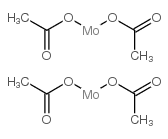
14221-06-8 |
| 文献:Johnson, Kara D.; Powell, Gregory L. Journal of Organometallic Chemistry, 2008 , vol. 693, # 8-9 p. 1712 - 1715 |
|
~0% 
14221-06-8 |
| 文献:Birnbaum, Amira; Cotton, F. Albert; Dori, Zvi; Kapon, Moshe; Marler, David; Reisner, George M. Journal of the American Chemical Society, 1985 , vol. 107, # 8 p. 2405 - 2410 |
|
~66% 
14221-06-8 |
| 文献:Baghurst, David R.; Mingos, D. Michael P. Journal of the Chemical Society, Dalton Transactions: Inorganic Chemistry (1972-1999), 1992 , # 7 p. 1151 - 1156 |
|
~58% 
14221-06-8 |
| 文献:Menezes, Jose C.; Romao, Carlos C. Polyhedron, 1990 , vol. 9, p. 1237 - 1240 |
|
~69% 
14221-06-8 |
| 文献:Wu, Ying-Yann; Chen, Jhy-Der; Liou, Lin-Shu; Wang, Ju-Chun Inorganica Chimica Acta, 1997 , vol. 258, p. 193 - 200 |
|
~63% 
14221-06-8 |
| 文献:Wu, Ying-Yann; Chen, Jhy-Der; Liou, Lin-Shu; Wang, Ju-Chun Inorganica Chimica Acta, 1997 , vol. 258, p. 193 - 200 |
|
~71% 
14221-06-8 |
| 文献:Jawiczuk, Magdalena; Gorecki, Marcin; Suszczynska, Agata; Karchier, Michal; Jazwinski, Jaroslaw; Frelek, Jadwiga Inorganic Chemistry, 2013 , vol. 52, # 14 p. 8250 - 8263 |
| 上游产品 5 | |
|---|---|
| 下游产品 1 | |
| 海关编码 | 2915900090 |
|---|---|
| 中文概述 | 2915900090. 其他饱和无环一元羧酸及其酸酐(酰卤、过氧)化物、过氧酸及其卤化、硝化、磺化、亚硝化衍生物. 增值税率:17.0%. 退税率:9.0%. 监管条件:AB(入境货物通关单,出境货物通关单). 最惠国关税:5.5%. 普通关税:30.0% |
| 申报要素 | 品名, 成分含量, 用途 |
| 监管条件 | A.入境货物通关单 B.出境货物通关单 |
| 检验检疫 | R.进口食品卫生监督检验 S.出口食品卫生监督检验 M.进口商品检验 N.出口商品检验 |
| Summary | 2915900090 other saturated acyclic monocarboxylic acids and their anhydrides, halides, peroxides and peroxyacids; their halogenated, sulphonated, nitrated or nitrosated derivatives VAT:17.0% Tax rebate rate:9.0% Supervision conditions:AB(certificate of inspection for goods inward,certificate of inspection for goods outward) MFN tariff:5.5% General tariff:30.0% |


